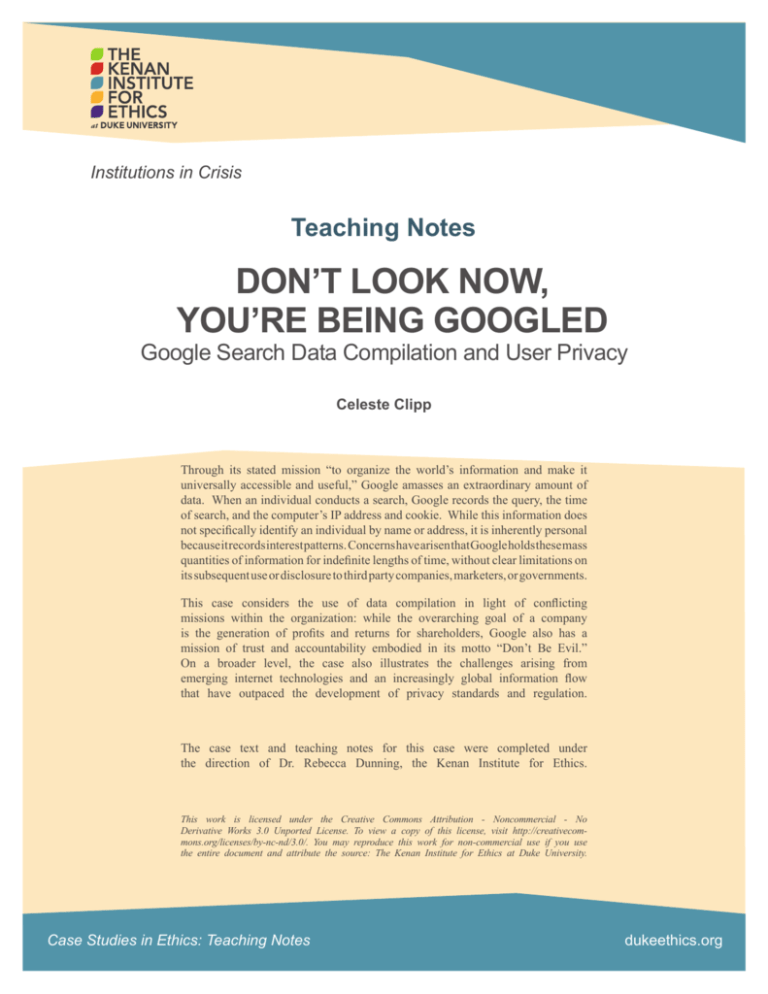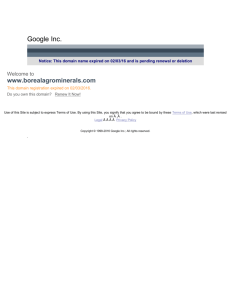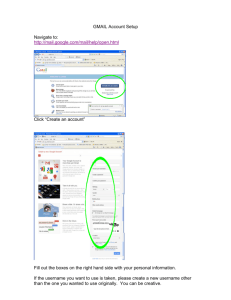DON'T LOOK NOW, YOU'RE BEING GOOGLED
advertisement

Institutions in Crisis Teaching Notes DON’T LOOK NOW, YOU’RE BEING GOOGLED Google Search Data Compilation and User Privacy Celeste Clipp Through its stated mission “to organize the world’s information and make it universally accessible and useful,” Google amasses an extraordinary amount of data. When an individual conducts a search, Google records the query, the time of search, and the computer’s IP address and cookie. While this information does not specifically identify an individual by name or address, it is inherently personal because it records interest patterns. Concerns have arisen that Google holds these mass quantities of information for indefinite lengths of time, without clear limitations on its subsequent use or disclosure to third party companies, marketers, or governments. This case considers the use of data compilation in light of conflicting missions within the organization: while the overarching goal of a company is the generation of profits and returns for shareholders, Google also has a mission of trust and accountability embodied in its motto “Don’t Be Evil.” On a broader level, the case also illustrates the challenges arising from emerging internet technologies and an increasingly global information flow that have outpaced the development of privacy standards and regulation. The case text and teaching notes for this case were completed under the direction of Dr. Rebecca Dunning, the Kenan Institute for Ethics. This work is licensed under the Creative Commons Attribution - Noncommercial - No Derivative Works 3.0 Unported License. To view a copy of this license, visit http://creativecommons.org/licenses/by-nc-nd/3.0/. You may reproduce this work for non-commercial use if you use the entire document and attribute the source: The Kenan Institute for Ethics at Duke University. Case Studies in Ethics: Teaching Notes dukeethics.org Teaching Notes Target Audience Organizational studies Ethics Privacy Regulation Business Administration Learning Objectives 1. Challenge students to describe the real value of privacy and its connections to personal ownership of information, autonomy, and individual freedom and relates these to the set of historical examples to which this case adds. 2. Explores the ethical culture of Google and gain a more thorough understanding of the conflicting missions that exist within the organization. 3. Discuss the need for a sustainable initiative to respond to privacy concerns in the context of fast-paced technological development and to evaluate the solutions that Google has put forth thus far. Questions and Notes for Class Discussion 1) Privacy, Ownership, and Autonomy: What, specifically, is meant by privacy? Why is this something that we feel the need to safeguard? What are other examples of crises where a company has failed to protect the privacy of its customers, particularly in light of emerging technologies? To respect a person’s privacy is to recognize their value as an autonomous human being and to acknowledge their right to individual freedom and self-ownership.1 The definition and understanding of privacy is highly variable and the justification for protection differs across individuals, cultures, and geographies. Challenges to privacy have arisen countless times with the advent of new technologies. For example, in the 2010 book The Immortal Life of Henrietta Lacks, journalist Rebecca Skloot tells the gripping story of a woman whose cancerous cells were replicated and used for research purposes in labs across the country, unbeknownst to Lacks or her family. Activists questioned the commercialization of a patient’s cells, asserting that the patient deserved a say in the process as well as a share in the profits.2 A more closely related example is that of privacy invasion by telemarketers, the resulting outrage from which culminated in the 2003 establishment of The National Do Not Call Registry by the Federal Trade Commission (FTC). In this case, the Tenth Circuit U.S. Appeals Court determined that the FTC’s legitimate interest in protecting in-home privacy was enough to justify a restriction of commercial speech. This topic closely parallels the issue at hand; in fact, Consumer Watchdog launched a campaign in the fall of 2010 satirizing Google CEO Eric Schmidt and calling on Congress to enact a national “Do Not Track Me” list.3 By December 2010, FTC Chairman Jon Leibowitz publicly advocated the development of a “Do Not Track” mechanism.4 1 Busch, Andreas. “The Regulation of Privacy.” Jerusalem Papers in Regulation & Governance, Working Paper No. 26. September 2010. 2 Skloot, Rebecca. The Immortal Life of Henrietta Lacks. New York: Crown, 2010. 3 Bilton, Nick. “Consumer Watchdog Group Goes After Google.” The New York Times. 2 Sep 2010. 4 Wyatt, Edward and Tanzina Vega, “F.T.C. Backs Plan to Honor Privacy of Online Uses,” The New York Times, 1 Dec 2010. Case Studies in Ethics: Teaching Notes 2 dukeethics.org 2) Google’s Ethical Culture: How would you characterize the ethical culture, or ethos, of Google as an organization? Are there tensions internal to the organization that challenge this ethos, and/or tensions between the organization’s management and its shareholders? The “ethical culture” of an organization is described as “the set of standards of evaluation and understanding of what constitutes ‘good’ and ‘right’” within the group.5 An organization’s ethos can be expressed explicitly, through company mission statements and mottos, or implicitly, in the casual practices, patterns, and mindsets of actors within the organization. Despite Google’s strong, overarching identification with its motto “Don’t Be Evil,” this intention can sometimes be lost when the concepts and algorithms designed by engineers are applied to human beings. As Ken Auletta describes in Googled, “Brilliant engineers are at the core of the success of a company like Google. Drill down… and you’ll see that engineering is a potent tool to deliver worthwhile efficiencies, and disruption as well.”6 Tension exists between the desire to create efficiency and innovation and the need to maintain the trust of consumers. Furthermore, within the culture of good “efficient” and “good” are used almost interchangeably, such that what would be most efficient is also deemed best for consumers. A further tension exists between Google’s espoused values and the demands by shareholders that the company generate profits. 3) Ethical Crisis and Intervention: Evaluate Google’s response to this crisis. Was it sufficient? What makes it sufficient, or insufficient? As a Google user, do you feel that the company is protecting your privacy and embracing a new culture of transparency and accountability? Is it Google’s responsibility to self-regulate, or should international laws be established to protect online privacy? An ethical crisis arises when an event, or series of events, challenges the existing ethical culture of an organization..7 In response to repeated complaints and concerns, Google has created a number of measures that promote transparency and user control over data collection, seeking to align its practices with its motto “Don’t Be Evil.” However, as the business goes forward, the desire to adhere to these goals will be tested more and more as technological advances are unveiled. It is unclear whether the new policies and overarching goals will be sufficiently flexible to be sustained in a rapidly changing and highly competitive industry. In her article “BP, Goldman Sachs, and Massey could learn a lot from ultimate frisbee,” Christine Bader claims that “We shouldn’t depend on government to make business act in the best interests of society. We need to cultivate in corporate executives respect not just for the letter but the spirit of the law.”8 Such an argument suggests that Google executives should pursue privacy protection regardless of legal boundaries. However, the establishment of a cohesive international law regarding online privacy would ensure that all online companies are held accountable to users and government alike. 5 Dunning, Rebecca. “Institutions in Crisis: Case Study Assignment.” Kenan Institute for Ethics, Duke University. http://www.duke.edu/web/ kenanethics/IICCaseStudyAssignment 6 Auletta, Ken. Googled: The End of the World as We Know It. New York: Penguin, 2010. Preface. 7 Dunning, 2. 8 Bader, Christine. “BP, Goldman Sachs, and Massey could learn a lot from ultimate frisbee.” The Christian Science Monitor. 2 Jun 2010. Case Studies in Ethics: Teaching Notes 3 dukeethics.org In-Class Activity In order for students to fully understand what Google “knows” about them, have them go online to http://www. google.com/adspreferences. On the page, Google lists what they believe to be a user’s interests and demographic information, which are stored on a DoubleClick advertising cookie in their browser. Students will likely be amazed at how the enumerated interests do seem to parallel their own. Additionally, the page displays an “opt-out” button if the user does not wish for advertisements to be based on collected data (see example in Exhibit A, below). However, even if a user chooses not to receive targeted advertising, their information will be collected regardless. Exhibit A: Case Studies in Ethics: Teaching Notes 4 dukeethics.org




